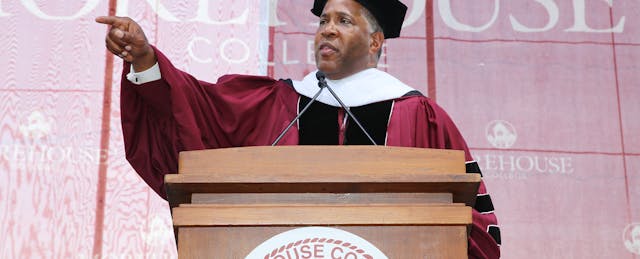Commencement speakers often tell graduates to follow their dreams, but yesterday the orator at Morehouse College’s graduation made that easier in a concrete way when he surprised the crowd by promising to pay off the student loans of all 396 members of the graduating class.
The speaker was Robert F. Smith, a billionaire who runs Vista Equity Partners, a private equity firm focused on software companies. Forbes magazine estimates that he is worth $5 billion, making him the wealthiest African American in the country.
Telling the graduates he was going to “put a little fuel in your bus,” he announced that “my family is making a grant to eliminate their student loans.”
That will cost the businessman an estimated $40 million, which Morehouse officials say is the largest gift in the institution’s history. It’s not his biggest donation to higher ed: In 2016 Smith made a $50-million gift to his alma mater, Cornell University. And he had given $1.5 million to Morehouse earlier this year, with most of it going toward student scholarships.
He challenged the class to “pay it forward” by making this same opportunity to “every class” in the future, but the gesture may prove difficult to replicate at other institutions.
Outsized Impact Predicted
Most large gifts to colleges pay for a building, or they endow a faculty position. Smith’s unusual approach focused on students—and not just on some unknown students in the future, but rather the few-hundred Morehouse students who have just completed college.
Recent research suggests that the move could have an outsized impact on the lives of the lucky students in the class of 2019 at Morehouse, a historically black college in Atlanta.
In a working paper published this month by the National Bureau of Economic Research called Second Chance: Life Without Student Debt, researchers made a novel analysis of how forgiving the debt of graduates impacted their lives.
It turns out that the largest provider of private college loans in the U.S., National Collegiate, once made an error with a group of borrowers who had gone into default that resulted in the debt being effectively forgiven. The researchers compared the economic outcomes of those forgiven students with a group of similar students who were in default on student loans.
Findings suggested those with their debt forgiven were able to significantly reduce other debt, and they were more likely to go back to finish unfinished degrees or advance to a higher-paying job. In other words, they became significantly more upwardly mobile and wealthy.
“Many of the choices you make between 25 and 45 are affected by how much debt that you have,” said one of the study’s authors, Marco Di Maggio, an associate professor of business at Harvard University, in an interview with EdSurge. One reason is motivation, the professor said. When workers know that any higher income they make will likely be garnished to pay off their loans, they have less incentive to seek promotions or more lucrative opportunities, Di Maggio said.
The professor added that he had never heard of a donation to a college like the one Smith made yesterday, and he said it is unlikely to be repeated.
“It’s a publicity stunt—just a way to get a lot of recognition on the donor and on the issue itself,” he said, predicting that even if another rich businessman made the same pledge, it would get less attention the next time after the novelty has worn off.
But he said the move could inspire colleges to consider using future donations to pay off the loans of students or graduates with the highest debt loads. And, he added, it is definitely sparking the public imagination to see the college-debt issue embodied by specific students. “It could create some momentum—or at least greater policy attention—to the student loan crisis,” he said.
Anand Giridharadas, author of “Winners Take All,” a book critiquing the country’s blind faith in the rich to do good even as income inequality grows, told The New York Times that Smith’s move was generous but not productive to the bigger issue of the student loan crisis. “A gift like this can make people believe that billionaires are taking care of our problems, and distract us from the ways in which others in finance are working to cause problems like student debt, or the subprime crisis, on an epically greater scale than this gift,” he told the paper.
Democratic presidential candidate and U.S. Senator Elizabeth Warren has made relieving student debt a key part of her campaign message, with a proposal to tax billionaire’s to pay for student loan forgiveness.
But for researcher’s like Harvard’s Di Maggio, the students at Morehouse present an exciting opportunity to measure just how much difference debt forgiveness can make.
“If I can get the data on these students,” he said, “that will be the next research paper.”


